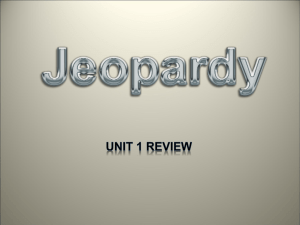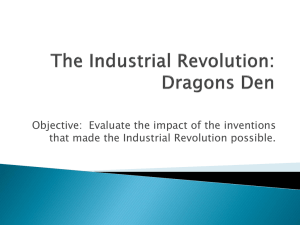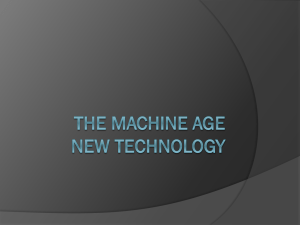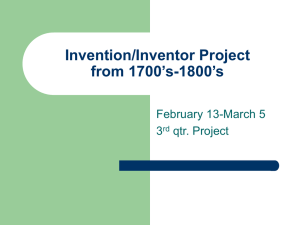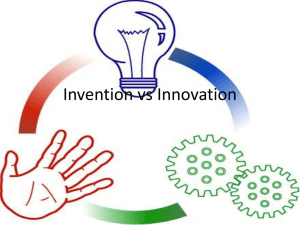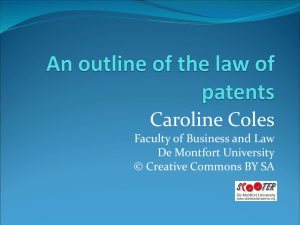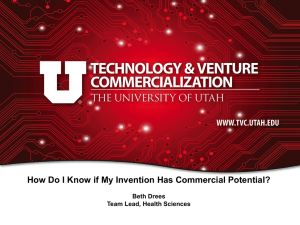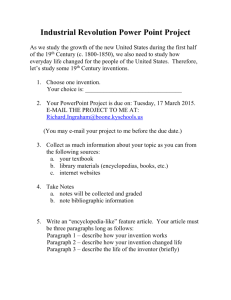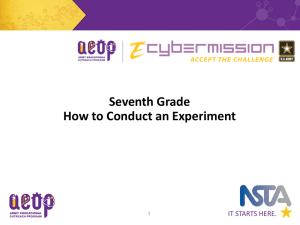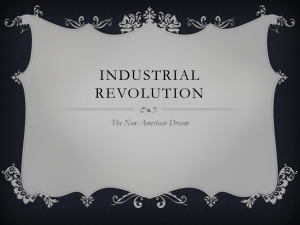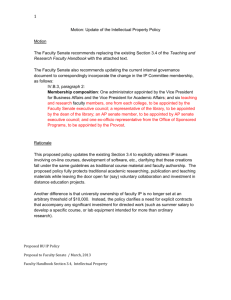Clean IP policy
advertisement
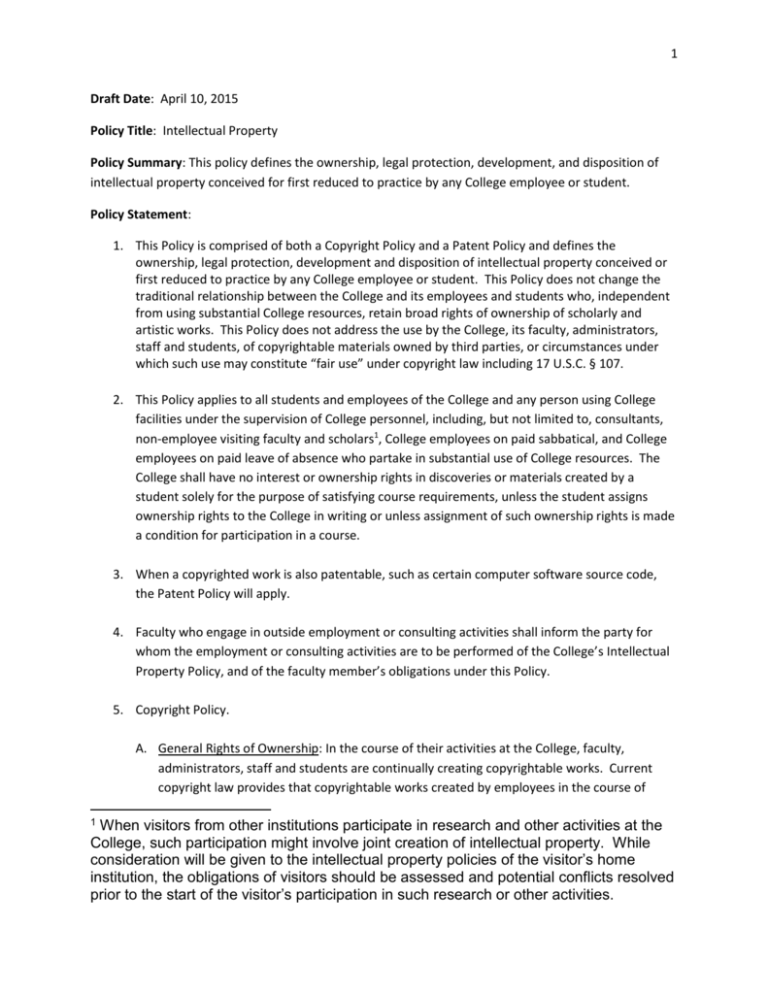
1 Draft Date: April 10, 2015 Policy Title: Intellectual Property Policy Summary: This policy defines the ownership, legal protection, development, and disposition of intellectual property conceived for first reduced to practice by any College employee or student. Policy Statement: 1. This Policy is comprised of both a Copyright Policy and a Patent Policy and defines the ownership, legal protection, development and disposition of intellectual property conceived or first reduced to practice by any College employee or student. This Policy does not change the traditional relationship between the College and its employees and students who, independent from using substantial College resources, retain broad rights of ownership of scholarly and artistic works. This Policy does not address the use by the College, its faculty, administrators, staff and students, of copyrightable materials owned by third parties, or circumstances under which such use may constitute “fair use” under copyright law including 17 U.S.C. § 107. 2. This Policy applies to all students and employees of the College and any person using College facilities under the supervision of College personnel, including, but not limited to, consultants, non-employee visiting faculty and scholars1, College employees on paid sabbatical, and College employees on paid leave of absence who partake in substantial use of College resources. The College shall have no interest or ownership rights in discoveries or materials created by a student solely for the purpose of satisfying course requirements, unless the student assigns ownership rights to the College in writing or unless assignment of such ownership rights is made a condition for participation in a course. 3. When a copyrighted work is also patentable, such as certain computer software source code, the Patent Policy will apply. 4. Faculty who engage in outside employment or consulting activities shall inform the party for whom the employment or consulting activities are to be performed of the College’s Intellectual Property Policy, and of the faculty member’s obligations under this Policy. 5. Copyright Policy. A. General Rights of Ownership: In the course of their activities at the College, faculty, administrators, staff and students are continually creating copyrightable works. Current copyright law provides that copyrightable works created by employees in the course of 1 When visitors from other institutions participate in research and other activities at the College, such participation might involve joint creation of intellectual property. While consideration will be given to the intellectual property policies of the visitor’s home institution, the obligations of visitors should be assessed and potential conflicts resolved prior to the start of the visitor’s participation in such research or other activities. 2 employment will be owned by their employers. Traditionally, colleges and universities have declined to assert ownership over works of scholarship created by faculty in the course of traditional academic activities. Therefore, the College assigns any ownership interest it has in Traditional Works of Scholarship to the person or persons who create such works, and such works shall be sole and exclusive property of the creator or author. i. The College retains the right to use Traditional Works of Scholarship for administrative purposes, such as satisfying requests of accreditation agencies for faculty-authored syllabi, assessments and course descriptions, and for use in the title or description of a College course in College publications. Additionally, in the event that a faculty member assigned to teach a course becomes unavailable to teach that course, the College shall be permitted to use materials related to such course for the duration of the semester in which the course was scheduled. B. The College shall make no claim of ownership with respect to materials created by a faculty member in the course of a disclosed and approved outside employment or consulting engagement if (1) the materials were created without the use of College resources. C. Traditional Works of Scholarship includes: syllabi and other original materials created for use in a College course, books (including textbooks), class notes, classroom presentation and instruction (regardless of the format of these materials or method in which they are delivered), research proposals, articles, other forms of textual material (whether in printed form or electronic media and including academic journals and professional resources), software, works of art and other creative works including music, lyrics, compositions, photographs, poetry, choreography, architectural works, sculpture, pictorial and graphic works, motion pictures, and sound recordings, which are created as part of the regular academic and scholarly activities of a person covered by the Policy. i. Exceptions: the College will retain ownership of copyrightable materials otherwise considered Traditional Works of Scholarship in the following circumstances: a. Where the production of such materials is part of a sponsored program; b. Where the materials are created under the specifically assigned duties of employees other than faculty; c. Where Substantial College Resources were used in creating the materials; d. Where the materials were specifically commissioned by College contract, or done as part of an explicitly designated assignment made in writing, other than normal faculty scholarly pursuits; and e. Where the material is closely associated with a patent owned by the College under the Patent Policy (this exception will typically apply to any copyrightable material created to effectuate an invention, e.g. software, or supplement an invention). ii. In cases where it is not clear whether or not these exceptions apply, authors are encouraged to pursue a negotiated written agreement as discussed herein. D. Substantial Use of College Resources means use of College resources that goes above and beyond those that are customarily and currently provided to College employees. College resources include all tangible resources provided by the College, including office, lab, and studio space and equipment; computer hardware, software, and support; and staff support. 3 Decisions about whether the use of these or similar resources is “substantial” or “customary and current” shall be determined by the Provost in consultation with the relevant department chair or supervisor in reference to the circumstances and practices within the discipline. Substantial Use of College Resources generally does not include use of telecommunications networks or computer hardware or software unless such use: i. Requires special licensing agreements that are beyond the scope of those provided to support College instructional or administrative activities; ii. Interferes with instructional activities (for example, by overloading the campus network resulting in diminished performance for other College users); iii. Requires allocation of server space that is beyond the usual allocation for an individual belonging to a given category of College user; iv. Requires purchase of hardware or Software that exceeds the capabilities of that which is normally provided to an individual belonging to a given category of College user; or v. requires licensing or outsourcing of specialized computer services (including the services of "courseware" providers). E. Sponsored Research: When the materials are created in the course of sponsored research funded by an outside agency or organization pursuant to an agreement approved by the College, ownership of materials will be determined by the applicable terms of the funding agreement. F. Distance Education Course Materials: include materials designed for use in a course in which more than 50% of the instruction and interaction occurs via electronic transmission, correspondence, or equivalent mechanisms, often utilizing electronically published course materials, instruction delivered by internet telecommunication or other computer storage media such as CD Rom or DVD, with faculty and students physically separated from each other and for which the College has a compelling interest because of its obligation to deliver advertised curricular programs and courses. i. Strategic judgments about distance course development or the development of whole degree programs offered via distance education media are to be driven by curricular needs identified and approved by appropriate faculty, department chairpersons, and deans in consultation with the Provost and director of eLearning. ii. Prior to the development or offering of any distance education course at the College, the author must execute a written agreement as set forth in Section G. This requirement and any restrictions on the ownership and use of distance education course materials are intended to involve the Provost and director of eLearning in determining appropriate uses of such materials, to further effectuate the College’s conflict of interest policies, and appropriate use of the College’s name, and to protect against infringement claims. iii. Responsibilities of Authors: Individuals who create distance education courses as set forth in this Policy shall agree to (1) revise the work as necessary to meet or exceed the Principles of Good Practice for Distance Education Courses, as outlined in the College’s Distance Education Handbook; (2) submit to an initial and periodic review of the work by the appropriate department chair and the director of eLearning; (3) update, edit, and revise course materials as necessary to keep course materials current; (4) warrant that they are the sole owners of the contributions to the work or that the contributions do not infringe on any copyright, violate any 4 iv. v. property rights, or contain any unlawful materials; (5) inform the College in advance of uses, reproductions, distributions and dispositions of the materials; and (6) abide by all applicable College policies, the Faculty Handbook, and state and federal laws. Right of Authors: Individuals who create distance education course materials as set forth in this Policy shall maintain the right to (1) make derivative works that do not compete or significantly conflict with the academic or financial interests of the College; (2) be identified as the author of the materials, including the right to decide whether to allow the author’s name to be displayed in association with the materials; and (3) use the materials for teaching, scholarship, research and service. The College shall make no claim of ownership in distance education course materials created without Substantial Use of College Resources that are not the subject of a sponsored research agreement or specifically commissioned College contract. vi. Authors of distance education course materials created with Substantial Use of College Resources including access to and use of specialized staff, facilities and equipment beyond that ordinarily provided, and materials created with the use of direct grants, additional compensation, or release time for course development shall grant to the College a non-exclusive license to use and market the materials as part of the College’s course delivery. The College will have the right to create derivative works based on the materials, assign use of the materials in the course or course components of another, and assign revisions and teaching of course materials to another faculty member if the author refuses to revise the materials in according to recommendations made during a review process. vii. If condition F.vi. above is met, then upon the author’s separation from the College, the College shall retain its non-exclusive license to use, update, and market the materials. The author shall retain the right to use and market the materials provided the College’s name or log is not used in connection with the materials. viii. Distance education course materials created at the instigation of the College pursuant to a specifically commissioned College contract will be owned by the College and the College shall have an exclusive right to use and market the materials. G. Disclosure Requirement: Any person formally affiliated with the College shall report to their direct supervisor in a timely manner any effort to create materials that might fall within the exceptions set forth in III.B, including any materials which made Substantial Use of College resources. H. Written Agreement Required: Negotiated written agreements are required under the following circumstances: (1) when materials were created with “Substantial Use of College Resources” (It is the responsibility of the author to seek clarification of whether the resources being used in the development of traditional works of scholarship constitutes “Substantial Use of College Resources”); (2) when more than one party is responsible for creating materials; and (3) when the materials are for use in a distance education course as set forth above. Negotiated written agreements shall address: 5 i. ii. iii. iv. I. 6. The rights of the author(s) and the College to use, distribute, market, and sell the materials; The division of revenues between the College and the author(s); The rights of the College to use, distribute, market and to modify the materials during and after the period of formal association with the College; and The rights of the author(s), the College, and/or external funding parties to be acknowledged or to withhold acknowledgement in the distribution or modification of the materials by the College. Administration: This Policy will be administered by the Provost, who may delegated his/her duties to such other officers or employees of the College as appropriate. Patent Policy. A. General Rights of Ownership. In the course of teaching, professional development and other intellectual and administrative activity at the College, faculty, staff, students, and others may make discoveries or inventions. This patent Policy establishes the procedure to be followed in the administration of inventions which result from teaching, professional development, and other intellectual activity performed under College auspices. Unless the terms of a sponsored research agreement or other contractual agreement provide otherwise, the College will own any discoveries or inventions conceived or first reduced to practice in the course of College employment or with use of College resources, facilities or personnel, as well as all related tangible research property including, but not limited to, models, devices, designs, avatars, computer software, storage media, text, chemical compounds and compositions, formulations, plant varieties, laboratory notebooks, clinical information, records and data related to discoveries. The College shall make no claim to an invention or discovery made by a faculty member in the course of a disclosed and approved outside employment or consulting engagement if (1) the invention or discovery resulted from work on a problem or topic proposed by the entity to which the faculty member is consulting and on which the faculty member has not engaged in research at the College and (2) the invention or discovery was conceived and first reduced to practice without the use of College resources, facilities or personnel. B. Disclosure and Assignment Requirements: In order to ensure that the College is fully informed of inventions and discoveries, able to make a proper determination of inventorship and ownership, and able to fulfill reporting obligations to governmental and other research sponsors, all persons subject to this Policy shall promptly notify and fully disclose to the College all inventions and discoveries resulting from various activities conducted wholly or in part at the College or under College auspices. Because patent rights may be lost if information describing an invention has been published prior to filing of a patent application, notice and disclosure of an invention or discovery should be made to the Provost’s Office at least two (2) months prior to any public disclosure (including but not limited to disclosures required in connection with sponsored research requirements, and any proposed publication or presentation, such as at academic conferences). Inventors must complete an Invention Disclosure Form, which is available from the Provost’s Office. Discoveries and inventions shall not be disclosed without the express written consent of the Provost or his/her designee. If an 6 inventor is uncertain whether the College has ownership rights in an invention, the invention shall be disclosed to the College. The College acknowledges the rights of inventors to take reasonable precautions to assure the confidentiality and physical security of formulas, methods, processes, patterns, compute code, devices, compositions of matter or other tangible research property. To protect and preserve the intellectual property rights set forth in this policy and to comply with federal regulations, authors and inventors shall execute assignments and other appropriate documents as may be requested by the College to perfect the College’s ownership rights, and shall cooperate with the College as reasonably requested in support of efforts to secure, market and transfer College intellectual property. The College will have 6 months to start the patent process or release invention rights. C. Commercialization of Inventions and Discoveries: The College has a right to apply for patent protection or otherwise protect and market the inventions and discoveries it owns. However, the College is not obligated to protect, enter into licensing arrangements, or commercialize any invention or discovery unless it has made an explicit contractual commitment to do so. If the College decides that it does not wish, and/or has no obligation to participate in patenting or licensing an invention, the College may release its interest in the invention to the inventor. In such cases the College may elect to retain an irrevocable royalty-free license to use the invention for education, research and other non-commercial purposes. Income earned from the sale, licensing, or other transfer of intellectual property of the College shall be received solely by the College and shall be distributed as follows: (1) reimbursement of all direct expenses related to prosecuting and maintaining the intellectual property protection and securing licenses, including fees for legal counsel or other experts, if required; (2) of the remainder, 50% to the inventor or inventors and 50% to the College. If there is more than one inventor, distribution shall be prorated according to the contribution of each as may be agreed in writing between the parties. Royalty income is payable to the inventor upon actual receipt by the College. If administrative/professional or classified staff make commercially valuable discoveries or inventions in the course of carrying out their assigned duties (e.g. the employee received a salary or wage for the purpose of developing the discovery or invention), there is not presumption that the College will share any resulting net revenue as set forth above. D. Administration: This Policy will be administered by the Provost, who may delegate his/her duties to such other officers or employees of the College as appropriate. At his or her discretion, the Provost may convene an Intellectual Property Advisory Committee (elected by the faculty), which shall be comprised of at least five members including one individual from Finance and Administration, and one faculty member from each School at the College. The Committee shall serve at the pleasure of the Provost, who shall appoint a Chair. The Committee shall make recommendations to the Provost concerning: (1) the interpretation of terms in this Policy, (2) recommending changes or exceptions, (3) disputes related to intellectual property; and (4) the College’s ownership 7 of particular works of intellectual property. Decisions of the Provost shall be final, except for disputes arising under (4), either the College or the inventor may request that the final decision be rendered by a neutral, third-party arbitrator, chosen with the consent of both parties. In such cases, the parties shall split the cost of arbitration. Reason for Policy: Teaching, scholarship and service are fundamental missions of Fort Lewis College (“College”). In the course of teaching, professional development and other intellectual and administrative activities at the College, faculty, staff, students and others may create materials, or make discoveries or inventions that are entitled to legal protection as intellectual property. Encouraging and supporting the creation of intellectual property is in the public interest and is consistent with the advancement and dissemination of knowledge and other well-established academic values including academic freedom, the promotion of excellence and innovation, support of the ability of faculty to publish, share information and collaborate in research activities, and support of students in full participation in these and other educational activities. Appendix A – Invention Disclosure Form This form is used to report an initial discovery or invention made by faculty members, fellows, and staff members (including student employees), by anyone using College facilities, or by anyone collaborating with any of the above individuals (“Inventors”). I. INVENTOR INFORMATION Please enter the name of all Inventors and sign where indicated. Corresponding Inventor (Primary Point of Contact) Name:______________________________ Telephone:__________________________ Department:_________________________ Inventor contribution (%):_______________ Home Address: ______________________ ______________________ Signature:___________________________ Title:____________________________ E-mail:__________________________ Campus Address:__________________ Personal e-mail: __________________ Country of Citizenship: ______________________ Date:___________ Inventor Affiliation:____________________ Name:_____________________________ Telephone:__________________________ Department:_________________________ Inventor contribution (%):_______________ Home Address: ______________________ ______________________ Signature:___________________________ Title:____________________________ E-mail:__________________________ Campus Address:__________________ Personal e-mail: __________________ Country of Citizenship: ______________________ Date:___________ 8 Inventor Affiliation:___________________ Name:_____________________________ Title:____________________________ Telephone:__________________________ E-mail:__________________________ Department:_________________________ Campus Address:__________________ Inventor contribution (%):______________ Personal e-mail: __________________ Home Address: ______________________ Country of _____________________ Citizenship: ______________________ Signature:__________________________ Date:___________ 9 II. INVENTION Inventions include new processes, products, apparatus, compositions of matter, living organisms, or improvements to existing technology in those categories. A. Invention title: (The title should be broad and non-confidential, i.e. what you can do, not how to do it.) B. Please briefly describe the invention: (If you have a manuscript, PowerPoint or other presentation, poster or abstract please attach it to this form.) C. Has the invention been disclosed publicly or offered for sale? (Disclosure includes a poster or other public presentation, publication in a journal, thesis, or book, email dissemination, internet/website publication or display, and conversation outside of the College not protected by confidentiality.) If so, when, where, and to whom? D. Is there a planned date of disclosure, publication, display or sale? E. What is the source of funds supporting this research (grant number)? F. Is a third party involved in this research, such as through a sponsored research agreement, consulting or option agreement? G. Is this research a collaboration with investigators at another institution or company? 10 APPENDIX B – PATENT AGREEMENT I have read and understand the College’s Intellectual Patent Policy. As a condition and in consideration of the following, as applicable: (1) my participation in sponsored research at the College; (2) my employment at the School of _____________; (3) my status as a visiting researcher at the College; and/or (4) opportunities made or to be made available to me to make substantial use of College administered funds, resources and facilities. I agree to be bound by all provisions of the Patent Policy and I: A. hereby agree to assign and do assign to the College all of my right, title and interest in any invention or discovery, developed in the course of my employment by the College or in connection with my participation in research or related activities at the College, which I am obligated to assign to the College under the terms of the Patent Policy; B. agree to execute such documents and take such further action as may be requested by the College to further implement the Patent Policy or this agreement; and C. agree to disclose to the Office of the Provost, promptly after discovery, any invention developed in the course of my employment by the College, or in connection with my participation in research or related activities at the College. Further, if I am a director or principal investigator of a sponsored project, I agree to secure signatures to the Patent Agreement from all research personnel, including students working on the project, at the time of their appointment and file the signatures with the Office of the Provost. Name: _____________________________ Signature:___________________________ Date:___________
